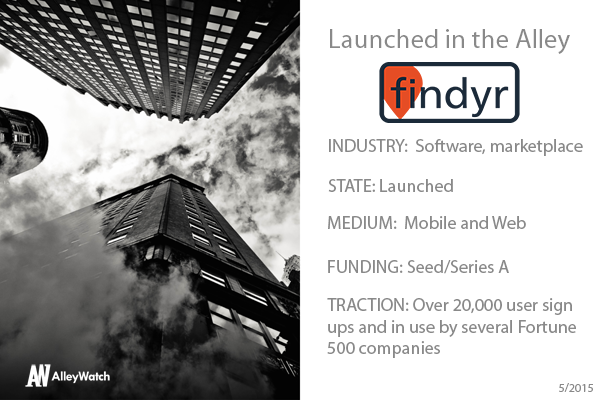Findyr is a global data marketplace and it’s all about people. When you need specific data, you source locals, and they collect the data you need. It’s your go-to when you need accurate data, anywhere in the world.
It’s this simple: request a survey, data point, photo or video at any location. Offer the amount that you’d like to pay.Findyr connects your request with users in the surrounding area.Done, and done with accurate information from locals.It’s a sort of offline Google search – and Fortune 500 are using it to get the localized results they’re looking for.
Founder and CEO Anthony Vinci tells us more about his literally locally-powered search engine.
Tell us about Findyr.
Findyr is a global information marketplace. On the demand side, users make requests for on-the-ground, local data, surveys, photos and videos. On the supply side, users around the world receive those requests on the Findyr app and provide the information.
In practice, Findyr acts like an offline search engine: you can request information at a location anywhere in the world.
Companies and individual researchers use Findyr for media acquisition, tracking current events, market research, mystery shopping, sentiment surveys, due diligence, inflation indexes and macro & micro-economic data collection.
How is Findyr different?
Findyr combines the peer-to-peer labor economy with the data economy. In doing so, it creates an entirely new form of information discovery. Rather than rely on costly bespoke research or large subscription datasets, Findyr enables users to get custom information from anywhere. While Google catalogs everything online, Findyr enables people to obtain new information that is offline.
What market are you attacking and how big is it?
We are focusing on companies/professionals in marketing, economic and financial information services. Findyr serves as a new tool that sits alongside an analyst, consultant or trader’s normal Bloomberg terminal, Comscore subscription, Google Search or Wikipedia. The market size is for such information is north of $30bn.
What is the business model?

Findyr is a marketplace. We take a margin on transactions that go through. Our goal is to grow the number of transactions through the system and thereby increase our revenue over time.
What inspired the business?
I began my career in the tech industry here in Silicon Alley at Linkshare.com, an affiliate marketing company, during the first dot.com boom. I went on to retool and did a PhD in International Relations at the London School of Economics where I did fieldwork throughout Africa. During that time I spent a lot of time in places like Sudan and Liberia doing on the ground surveys. When I returned to the US I realized that there was a way to technologically enable the collection of on the ground data and information and, by using a marketplace approach, actually directly benefit those on the ground doing the collection and link them to the global economy.
What types of data are people most often seeking according to your platform?
A lot of transactions on the marketplace involve market research and due diligence. For example, looking at local prices or consumer sentiment. We also provide the basis for local inflation indexes and food price indexes. More and more, we are receiving requests from media and news companies looking for local photos and videos that show what is really going on.
What are the milestones that you plan to achieve within six months?
We are growing our marketplace everyday. The goal is to make Findyr an indispensible tool for researchers, analysts, consultants and media makers. In six months we are looking to increase marketplace transactions, in particular through attracting thousands of individual requesters and hundreds of companies to the site.
What is the one piece of startup advice that you never got?
Persistence is the number one feature of success in this industry.
By the way, a very useful piece of advice that I got from one of my investors – Adam Riggs former CFO and President of Shutterstock.com – is to send user stats to the entire company every hour, every day, so that everyone knows what you’re fighting for and where you’re at in that fight.
If you could be put in touch with one investor in the New York community who would it be and why?
I think that Fred Wilson at Union Square Ventures would be interesting to talk to and I think he might find our business model interesting.
Why did you launch in New York?
New York City is the perfect balance of access to tech talent and to customers. I also like the Silicon Alley assumption that you should actually have a cash-generating business model from day one.
Where is your favorite outdoor bar in the city for a drink when it is actually warm out?
Hands down my favorite place to drink in NY is at the Explorers Club, where I’m a member, and when its summertime we do it on the terrace. Closer to the office, Coffee Shop in Union Square is always a good one.





